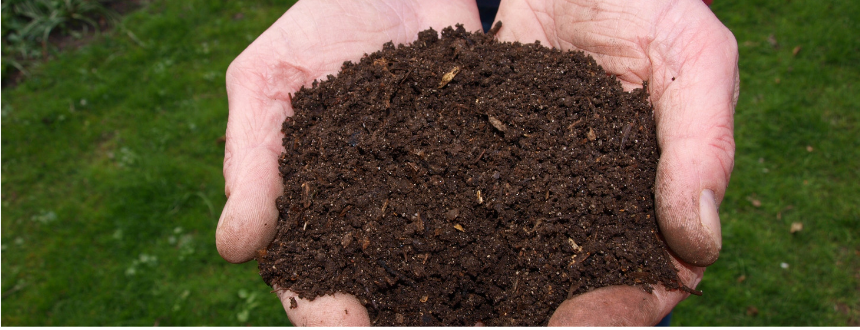
Compost Soil Amendment
A soil amendment is any material added to soil to improve its properties. Compost soil amendments improve soil’s physical, biological, and chemical properties. First, compost supplies nutrients essential to plant growth. Compost contains small amounts of nitrogen, which is often the limiting soil element for optimum plant growth. Compost nitrogen is in an organic form and must be mineralized (decomposed or oxidized chemically into plant-accessible forms), which occurs slowly in natural systems. Regular compost use can create organic reserves that release nutrients incrementally over many years. Compost supplies many other plant-essential elements such as phosphorus, potassium, calcium, sulfur, and micronutrients. The concentrations of these nutrients depend largely on the feedstock used to produce the compost. See the Compost Research & Education Foundation’s compost specification sheet for supplementing plant nutrition.
Plants obtain nutrients from soils in the form of dissolved salts, but high salt concentrations can injure sensitive plants. Salts can occur in native soils, in irrigation water (especially groundwater), and in compost. Manure-based composts tend to have the highest nutrient and salt levels. Compost made from green materials tends to have lower levels of nutrients and salts. Because plants differ in their sensitivity to salinity, it is best to follow the guidelines for each plant type.
The following are the average nutrient values from more than 1,200 compost samples from the Western United States (data from Soil Control Labs, Watsonville, Calif.):
- Macronutrients:
- N=1.6%
- P=0.6%
- K=1.1%
- Secondary Nutrients:
- Ca=3.3%
- Mg=0.6%
- S=0.5% (as SO4)
- Micronutrients:
- Fe, Cu, Mn, Zn, B, Na
Systems/Treatments that Use Compost to Amend Soils
The following systems/treatments use compost to amend soils:
- Biofiltration strips and biofiltration swales
- Compost blankets
- Compost socks
- Engineered soil
- Green/living walls
- Green roof/rooftop gardens
- Hydroseed and hydromulch
- Rain gardens
In addition, compost amends soils for the following:
- Agriculture – croplands/rangelands
- Carbon sequestration
- Erosion control
- Fire Remediation
- Riparian restoration
- Stormwater management – green infrastructure and LID
- Street and roads network
- Sustainable landscaping
- Water conservation
Benefits
- Provides plant nutrients
- Increases plant-rooting depth
- Increases soil organic matter
- Improves water infiltration
- Conserves water
- Improves water quality
- Mitigates climate change
- Reduces greenhouse gas emissions
- Saves energy
* See above links for additional information on benefits, design, limitations, references, and research.
Resources
Research
A large body of research exists on the effect of compost on soil biological, chemical, and physical properties; plant growth and health; carbon sequestration. See above toolkit webpages for research.
Resources
For more information contact: Organic Materials, organics@calrecycle.ca.gov

